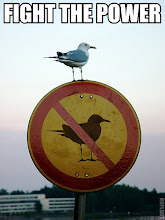Carrot…
Horshoe...
Radish?
Aubergine...
One small aubergine…
If one was reading a recipe book, and had never come into contact with an aubergine before, how would that person know if it was small? He could quite easily pick out an aubergine that seemed small at the time, but was actually a large aubergine amongst very large aubergines. It must be a very artificial shop. I wouldn’t want to shop there; god knows how much things have been injected with what. I think that’s why Yugoslavians are so tall; there was a growth hormone in their food, and it turned them all into giants. I wonder if it’s true. The way I explained it sounds like an urban legend, though it sounded plausible at the time I heard it. Though most things DO sound plausible to me.
The recipe could be ruined if he picked a large aubergine. It would taste too aubergin-ey. What does an aubergine taste like? I can never recall the difference between marrows, aubergines, that purpley thing, and generally anything that resembles a cucumber faintly.
Cucumber…
Is that what a cucumber should be called? Cucumber… I’m so used to associating that word with the vegetable, it’s almost impossible to have that word belong to something else. I wonder if that’s why older people can’t learn languages as well; they’re more used to things being associated with other things that they can’t comprehend things otherwise. Multilingual people must be quit open minded then.
Who says a cucumber should be called a cucumber? I have a feeling that language would be much more successful if someone with, say, synesthesia got to name everything.
‘Hey, you there!’
‘Yes?’
‘What does that longish green vegetable over there sound like?’
‘Hmm, it sounds more like rumplecrutch than anything else.’
‘Ah! So it’s not a cucumber, then?’
‘Goodness, no! A cucumber is a rather painful sports injury!’
And so the conversation continues as most conversations do. How do most conversations continue? I find myself switching from this to that when talking to someone, randomly saying whatever my mouth thinks appropriate at the time, without ever consulting my brain. If I try to consult my brain, then I can never think of anything to say. It’s like playing the guitar; if you concentrate too much on it, you’ll muck up. If you’re trying to write a song, it’ll never come out as good as if you just start playing and feeling the chords and music. I suppose that’s why our mouths have nerves, so we can feel what we’re talking about without ever having to consult our brain. How confusing would it be if your whole mouth went numb, and you couldn’t feel that you were talking about, but you could hear what you were talking about? How could you be sure it was actually you talking? It would be like when you get pins and needles in your leg, and it goes numb. Then you wonder where you leg had got to, so you poke it to see whether it’s still there, which of course you can’t tell because you can’t feel yourself being poked by yourself. My leg always feels very different if it decides it’s not a part of me – it genuinely feels as if it belongs to someone else. I wonder if it decided to swap bodies for a bit? I wonder if a paraplegic somewhere suddenly got pins and needles in their leg for 5 minutes? They must be very confused, happy and angry all at once. They must be confused, since they were told they would never feel anything again, happy because they’re feeling their legs, and angry because they must think it’s rather cheeky for the first thing for them to feel in years is pins and needles, which, let’s face it, must be really annoying.
But then your leg comes back, since it felt rather unwelcome in the paraplegic’s body, since the paraplegic was angry at it for bringing pins and needles for the first time in 5 years. Then the leg takes it all out on you by giving you excruciating pain while it’s coming back. Which is rather unfair on both you and the paraplegic.
The leg is a rather mean and vindictive limb.

No comments:
Post a Comment